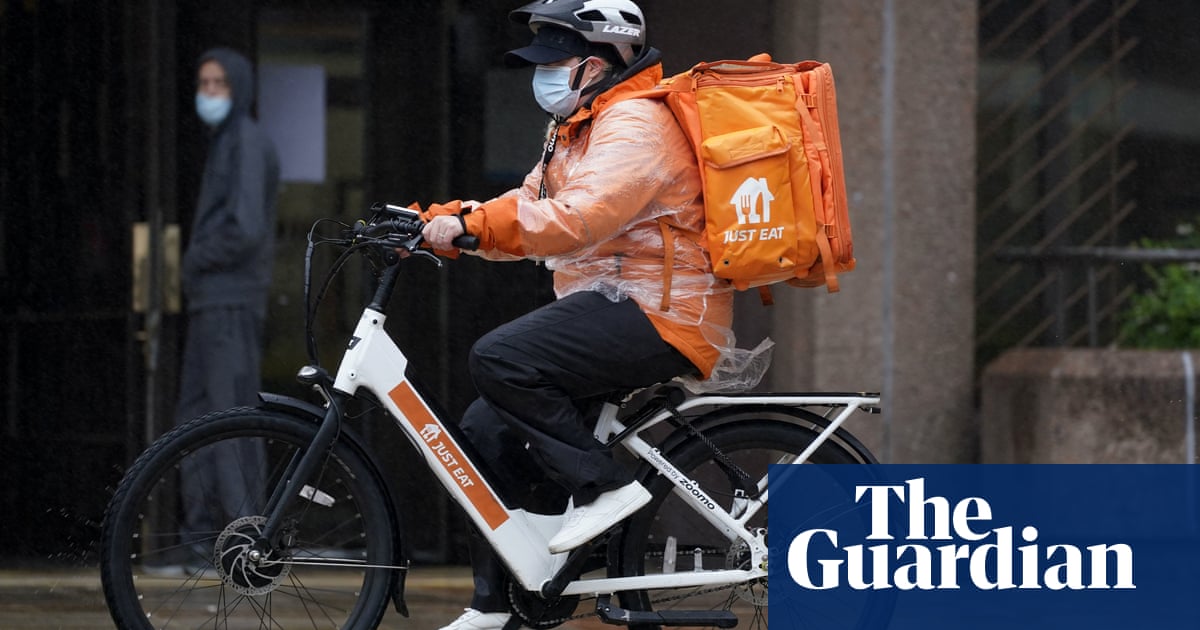
Ordering a takeaway and sitting down with a box set was the height of entertainment for most people during successive coronavirus lockdowns – and this served up bumper sales and profits for a string of food delivery companies.
But now that restaurants, cafes and other hospitality venues have reopened, will consumers lose their taste for ordering and go back to eating out?
Investors will get more answers about how food delivery firms are faring following the easing of Covid restrictions when Just Eat Takeaway releases its first-half results on Tuesday. The food delivery service’s revenue for the quarter to June is forecast to hit €1bn (£850m), according to the average estimate of analysts polled by Reuters.
The company, which is headquartered in Amsterdam, has already indicated that orders rose by 61% between January and June and raised its overall order growth guidance for 2021 – excluding US-based Grubhub – to 45% from 42%.
Last week, Just Eat’s main UK rival, Deliveroo, painted a fairly rosy picture of post-lockdown trading for food delivery companies, dishing up news that it had more than doubled its customer orders in the first half of 2021 as appetite for takeaways continued to grow even after hospitality venues reopened.
Deliveroo’s founder and chief executive, Will Shu, cautioned that demand for food deliveries “may moderate later in the year”, but also said he believed the pandemic had accelerated consumers’ shift to buying food online.
In this highly competitive market, Just Eat has size on its side. It was formed when Dutch firm Takeaway took over UK rival Just Eat in a fortuitously timed £6.2bn deal in early 2020. The buying spree continued when Just Eat Takeaway snapped up Grubhub for £5.8bn – securing access to the lucrative US market and creating the largest food delivery service outside China, serving customers in 25 countries.
Earlier this year, Just Eat – which also competes with Uber Eats in the UK – said it had put “tremendous effort” into improving its British business, doubling its salesforce and increasing restaurant choice.
It said this investment had already helped it gain online share in the UK (where pizza is the most-popular dish, followed by Chinese and Indian meals) – especially in London – and added that it expected pre-tax losses to have peaked by June.
Despite these positive noises, Just Eat’s share price performance has been disappointing in recent months, and has been on a downward trend since October last year, when it hit a peak of €110. It’s currently hovering just under €73.
The company’s low valuation has irritated one of its largest shareholders, US-based Cat Rock Capital, which holds a 4% stake. In a presentation entitled “Just Eat must deliver”, it described the company as a “fantastic” business, but criticised its relations with investors.
It blamed “deeply flawed communication” for Just Eat being “deeply undervalued and vulnerable to takeover bids at far below intrinsic value”.
In a crowded market, where new competitors are snapping at its heels, Just Eat enjoys widespread name recognition with consumers.
“Just Eat pulled a blinder with their sponsorship of the Euros football this summer,” said Danni Hewson, financial analyst at stockbroker AJ Bell, pointing out that the company’s share price rose before any England match. She added that continued order growth could make investors take another look at food delivery firms’ shares.
“They seem undervalued, Just Eat and Deliveroo both,” she said. “As you start to see these businesses maintain that delivery share, they won’t build on it in the same way, but they will maintain it. That is when investors may start to think it’s time to take a look at the business, particularly if they can claw their way to profit.”












